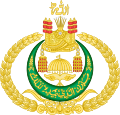Head of government of Brunei
The prime minister of Brunei (Malay: Perdana Menteri Brunei; Jawi: ڤردان منتري بروني) is the head of government of Brunei. Concurrently, the title is held by the sultan of Brunei, who as sultan is also the head of state of the country. The prime minister, minister of foreign affairs, minister of finance and economy, and minister of defence are all the Sultan of Brunei. He is Brunei's Supreme Executive Authority in his capacity as the Sultan and Yang Di-Pertuan. The Privy Council, the Council of Succession, the Religious Council, the Council of Cabinet Ministers, and the Legislative Council support him in carrying out his responsibilities.[1]
History
Chief Minister
The Supplementary Protectorate Agreement in 1906 was repealed and the Residential system was abolished as part of the 1959 Agreement between Brunei and the United Kingdom. As a result, the position of high commissioner took the role of the resident post, which was eliminated. The position of Menteri Besar (Chief Minister) was established in replacement of a resident and is headed by the sultan.[2] Its duties include exercising executive authority inside the state.[3][4]
The Sultan of Brunei was given ultimate executive control over the state, according to one of the key clauses of the 1959 Constitution. The Chief Minister, and the State Secretary,[5] who were required by law to be Malay people who practiced Shafeite Islam,[6] were the two most important officials the monarch could choose to assist him in running the state.[3][5]
The former State Council was replaced by the Executive Council (now Council of Cabinet Ministers)[7] and Legislative Council, and the sultan had ultimate administrative authority in the state under the terms of the new constitution, which was proclaimed on 29 September 1959. The Chief Minister, the State Secretary, the Attorney General, and the State Finance Officer were the four most significant officers in the state's administration.[3][8]
On 20 December 1962, with the establishment of the Emergency Council (Majlis Darurat), the Executive Council (Majlis Mesyuarat Kerajaan) was temporarily replaced by the Emergency Executive Committee (Malay: Jawatankuasa Kerja Darurat). This committee was established in response to the Brunei People's Party-led uprising in 1962 and given the authority to support the nation's administration, which had been disrupted by the uprising. In the process, the committee also set aside money for the British Army, who had been called in to put down the uprising, to have accommodation and other amenities. Marsal Maun, the then-Chief Minister, presided over the committee.[3]
Sultan Omar Ali Saifuddien III established the Royal Commission in relation to the notion of Federation of Malaysia's creation. It was also chaired by Chief Minister Marshal Maun, along with a number of community representatives.[3]
Prime Minister
As soon as Brunei declared its independence from the United Kingdom on 1 January 1984, the office was established. The position of Perdana Menteri (Prime Minister) took the role of the Chief Minister. As per the requirements of its predecessor, the individual needs to be a Malay Muslim.[9] Sultan Hassanal Bolkiah became the first prime minister of Brunei.[10]
It seems customary for government ministers to ask for, or receive a request for, a private meeting with the Sultan instead than assembling at a table overseen by him. "Primus inter pares" refers to him in the audience as their sovereign rather than as a prime minister. The ultimate executive power is not with a "Prime Minister," but with "His Majesty the Sultan and Yang Di-Pertuan". Although it is tangential to the connection and engagement with a specific minister, the sultan's role as prime minister serves as an example of his authority.[7]
Prime Minister's Office
The Prime Minister's Office of Brunei is located near the Edinburgh Palace (Istana Edinburgh) in Airport Lama, Berakas northeast of Bandar Seri Begawan.[17]







